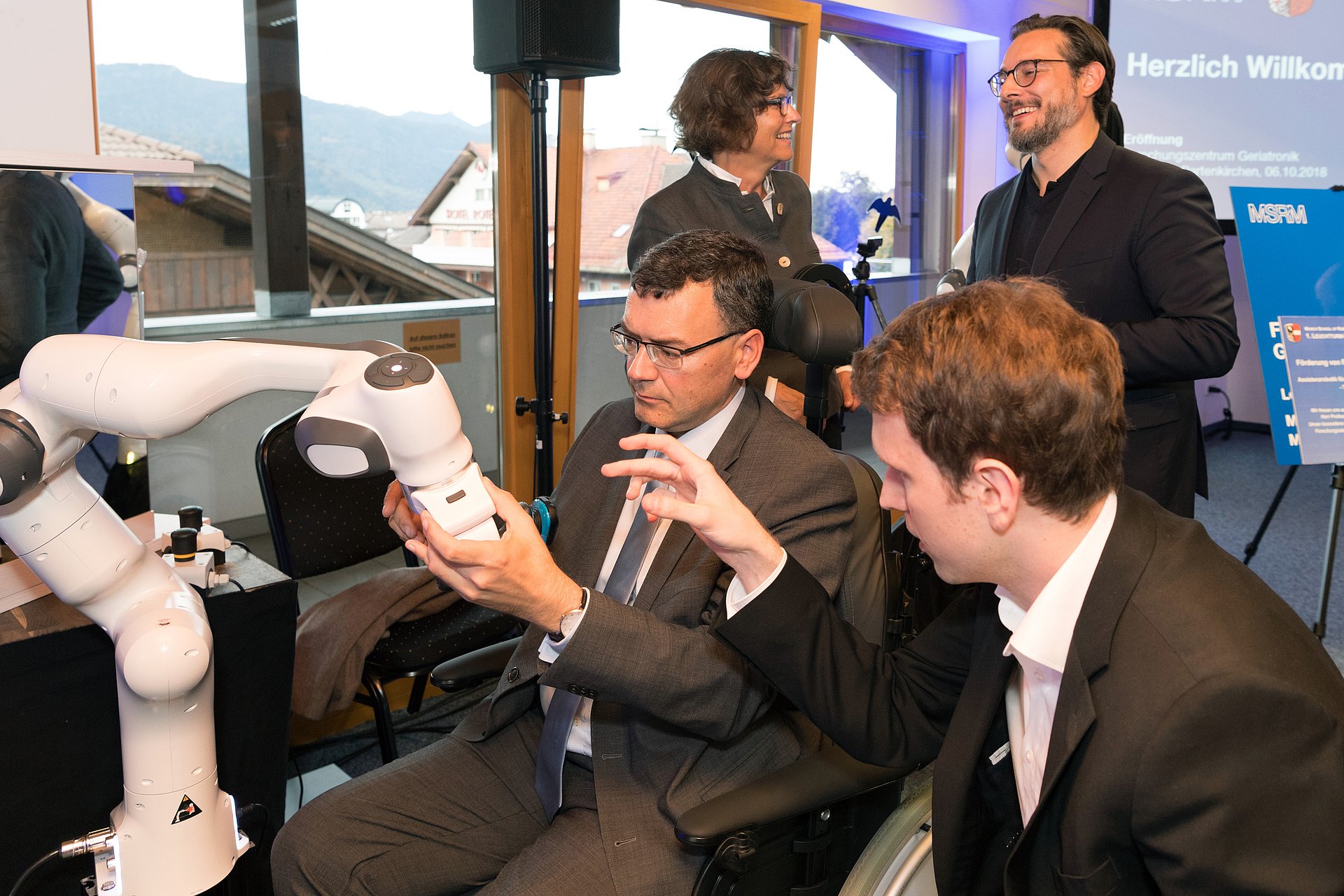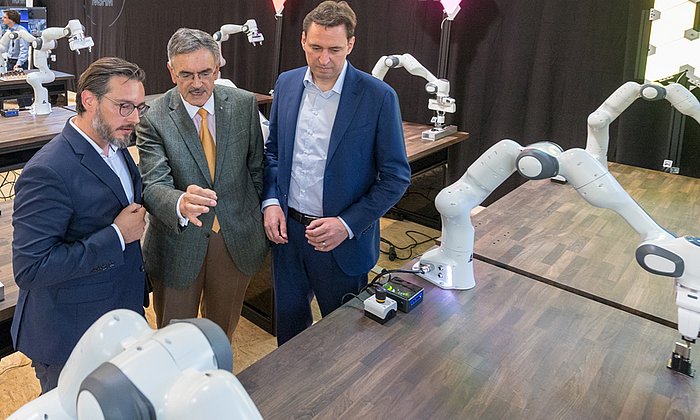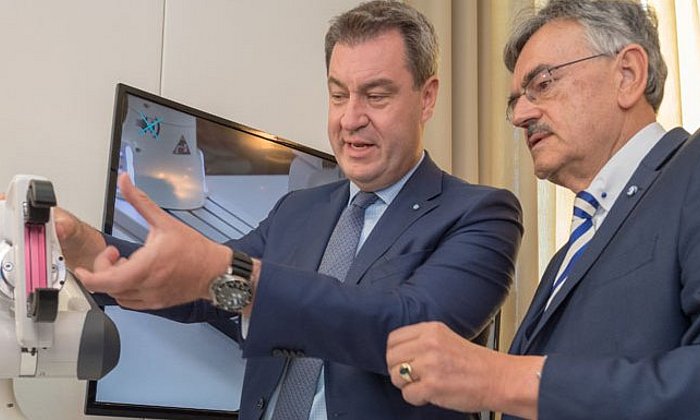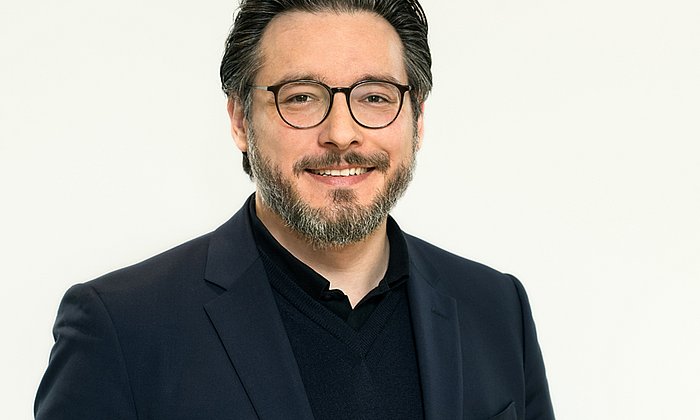TUM opens Geriatronics User and Research Center in Garmisch-Partenkirchen
Independent living for the elderly with robotic assistants

In the former Garmisch-Partenkirchen hotel and catering college, research will soon be started on new robotic assistants. The center will begin with about 15 scientists from the Munich School of Robotics and Machine Intelligence (MSRM) working in a 700 square meter space distributed over two levels. This will later be expanded to as many as 40 MSRM researchers. The TUM Geriatronics User and Research Center is an integral part of the first MSRM lighthouse initiative, whose key research fields include the future of health.
At the opening of the new center in Garmisch-Partenkirchen, State Minister Dr. Florian Herrmann, a member of the Bavarian cabinet and the head of the state chancellery, said: "We want everyone to be able to live and grow old with dignity. Along with an extensive package of nursing care measures passed by the state of Bavaria, we are also making that field a high priority for research funding. With the opening of the geriatronics center in Garmisch-Partenkirchen, a genuine research center for robotics application in nursing care will be established. In his government declaration in April, Dr. Markus Söder, the Minister President of Bavaria, announced that scientists would be working here within less than six months. The technical innovations developed in Garmisch-Partenkirchen will especially help the elderly to live independently in their own homes for as long as possible. As a result, it is already clear at this point: This center will yield enormous benefits for a great many people."
The main MSRM site in Munich and the new TUM User and Research Center in Garmisch-Partenkirchen will engage in joint and complementary research, covering both technology and field work. This will be made possible with funding from the Bavarian Ministry of Economic Affairs and LongLeif GaPa gGmbH, which acts on behalf of the municipality of Garmisch-Partenkirchen to administer the resources provided by the Leifheit Foundation.
Direct contact with future users
"The name sums it up. We are here to engage in research in geriatronics and bring the technology into contact with the people in Garmisch-Partenkirchen. After all, they are the intended beneficiaries of the technologies we develop," said Prof. Sami Haddadin, the director of the MSRM, at the opening ceremony. "That is the only way to ensure that we design our robots to meet people's needs and that people's initial fears are properly addressed from the start."
The most important project is the two-armed robotic assistant GARMI. It is intended as a useful aid for older people in such everyday activities as getting up from a chair or as an intelligent tool in telemedicine. For example, GARMI could enable doctors to perform routine examinations from a remote location or even to provide immediate help in an emergency.
Garmisch-Partenkirchen as a model town
Dr. Sigrid Meierhofer, the mayor of Garmisch-Partenkirchen, who was also on hand for the festivities, said: "I'm delighted that I can join TUM here today to celebrate the opening of the new center." Viktor Wohlmannstetter, the managing director of LongLeif, summed up the cooperative project launched by LongLeif, the municipality and TUM: "Our goal is for Garmisch-Partenkirchen, by applying the senior care concepts of the future, to become a model town for the use of intelligent robot assistant systems in old age."
The former hotel and catering college is intended only as a temporary home for the TUM project, which is initially funded for an eight-year period. The long-term concept calls for the geriatronics user and research center to be located on the planned LongLeif Campus, which will also be home to a "generalist" training center for nursing care workers and a new nursing home to be built by the Caritas charity. "Based on current information, the search for a suitable site at a central location could be completed by the end of this year. Work on the campus can then begin. The municipality is now awaiting word from the Bavarian state government that it will give the green light for the construction and long-term operation of TUM's Geriatronics Research Center on the campus," said the mayor, who also chairs the supervisory board of LongLeif.
More Information:
Munich School of Robotics and Machine Intelligence (MSRM)
Contact:
Prof. Dr. Sami Haddadin
Technical University of Munich
Munich School of Robotics and
Machine Intelligence (MSRM)
Tel: +49 (89) 289 29400
geriatronik@msrm.tum.de
Viktor Wohlmannstetter
LongLeif GaPa gGmbH
Contact for Journalists:
i.A. Petra Göttinger
Tel.: +49 (8801) 1373
info@longleif.de
High-Resolution Images
Technical University of Munich
Corporate Communications Center
- Paul Hellmich
- paul.hellmich@tum.de
- presse@tum.de
- Teamwebsite


